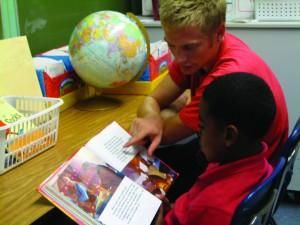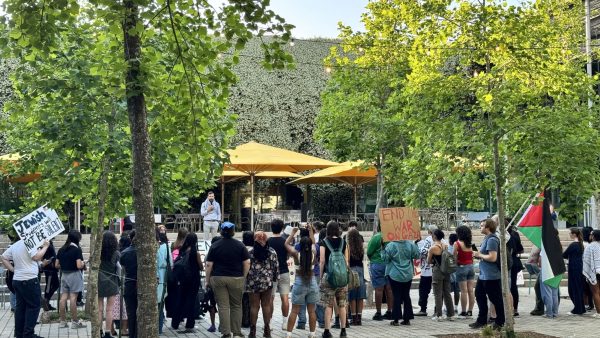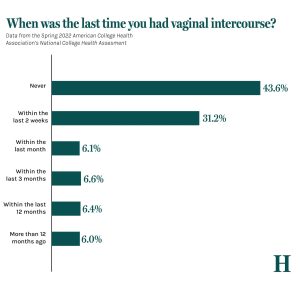No headline provided

April 13, 2012
The walk from Tulane’s campus to Benjamin Banneker Elementary School took freshman Charisse Poston all of 15 minutes. Upon arriving at Banneker, Charisse passed through a metal detector and made her way upstairs to a sixth-grade boys English classroom. Inside the classroom much of her time is spent helping the teacher maintain order. After an hour and a half of chaos, Charisse walked down the hallway to the reading room to spend the rest of her time with her reading buddy.
“The classroom is crazy,” Poston said. “My first day when I went in, I had no idea there are schools like that in the entire world. The kids kind of do whatever they want, they get up whenever they want, they throw things at each other, they have fights sometimes, but I still really like going to the class. All of the kids, once you talk to them individually, have something to say and are really smart, but there’s no individualized attention in the classroom.”
Benjamin Banneker Elementary is in the Recovery School District, a district run by the state of Louisiana, and redesigned shortly before Hurricane Katrina to include pre-kindergarten through eighth grade. At the start of the 2011 school year, Banneker was required by the district to take in adjudicated juvenile students. Because Banneker is in the RSD, it does not have the charter school luxury to turn away students once it reaches capacity. Principal Cheryllyn Branche said the school does not have the resources to adequately care for the growing student population as well as those with behavioral problems.
“We have one school security counselor for 555 students,” Branche said. “Our school budget did not allow us to hire additional school security. We have one school counselor, partially funded by a grant. If we cloned her, a couple of times, we could do more work on our students’ interpersonal skills. I think most school leaders will tell you more staff is needed to deal with the problems and issues students and families present.”
Tulane at Banneker
Tulane’s Site Director Marie Gould designed the reading room program. Gould said Tulane students provide the children with positive role models whom they may not otherwise have exposure to.
“The Tulane students are the brightest part of everybody’s day,” Gould said. “If you talk to the student, they’ll tell you some of the situations are very chaotic here. There are so many disruptive kids in the building, and they’ve put large numbers of disruptive kids in the same building and they have not provided any additional security. So you have kids who need all the mentoring they can get, and right now they’re getting it from the Tulane students, and that’s about it.”
Professor Carol Whelan is the lead instructor for the Tulane students who participate in service learning at Banneker. Whelan said the Tulane students give the children individualized attention they rarely receive in the classroom.
“I see good relationships are built between the Tulane students and the Banneker children,” Whelan said. “Its one of the few opportunities that these children have to have a one on one relationship with an adult who is there just to help them.”
As a part of the course, Whelan’s students are working on designing social innovation strategies to improve the learning environment at Banneker and the city’s overall educational system.
“In our class, we’re working on strategies involving social innovation in education, and instead of looking at the school and what’s going on there as one big problem after another, they’re looking at it more in the light of a social innovator,” Whelan said. “They’re looking at what is it that we can do. What kind of solutions can we come up with that would be helpful, and they really have a very positive attitude I think towards what they’re doing.”
Poston said she loves working at Banneker and believes the Tulane students’ presence there makes a difference in the lives of the students.
“The reading buddy program is awesome, and the kids love going to the reading room and they love seeing their reading buddies,” Poston said. “You see a significant improvement in all of your reading buddies, but I think in the classroom assistance could be improved.”
Poston continued to talk about one of the students she often works with who suffers due to the lack of specialized attention, and the number of children with behavioral issues.
“I usually sit with one sixth grader who can’t read, but he’s not a behavior problem, so he is basically just ignored,” Poston said. “I don’t think it’s fair that they have to take in behavioral problem kids when they don’t have any extra support for them, and it definitely changes the environment of the school and the classroom.”
Junior Emma Murray works four days a week at Banneker as a teacher’s assistant in the second grade. Murray said fights sometimes break out amongst the students, but she has never felt unsafe.
“I think there’s more fighting than you’d expect, but they’ve also been exposed to more than the average 7-year-old,” Murray said.
Gould said she strives to maintain a safe and productive environment inside of the reading room but worries about the students outside of her classroom.
“You have all of the kids riding on buses to and from school and with only a bus driver,” Gould said. “There are cameras on the buses, but no other adults to monitor them. And kids in this school go up to ages 15 and 16, and I have a concern about little children riding on school buses with 15- and 16-year-old big kids who have a record of behavior problems. I worry about these little kids on the school bus. That’s who I worry about the most.”
Branche said having Tulane students in her school is beneficial for the younger children by allowing and allows them to interact with an older student whose background and experiences may be different than theirs.
“Our children get a chance to spend time with a young adult or a supportive volunteer to work on reading skills and to spend time talking about a book they have read,” Branche said. “Increasing literacy skills for young children helps them to develop a lifelong love of reading. Additionally, they may develop relationships with reading buddies who are more often coming from backgrounds or places that are different from the families and adults with whom the students live.”
Gould agrees that the relationships built between Tulane students and the Banneker students are mutually beneficial but said that the students’ experience could be improved if the school were given the external support it needs.
“It’s hard on everybody,” Gould said. “Tulane students are the only bright spot of the year, because they come in with energy, they’re not tired, they’re not burned out. But it’s not ideal for the Tulane students either. Teachers aren’t able to do their best in the classroom. And they’re not able to do their best teaching because they’re so busy controlling behavior.”
Banneker and the state of national education
Since the start of the school year, 102 students have enrolled at Banneker, 54 of whom arrived since January.
Branche said the problems at Banneker are not isolated, and her concerns are ones shared by educators across the country.
“Very few educators would say their schools are well funded,” Branche said. “Even though investing money is not the only solution, one of the changes I would love to see is for the funding for the schools not to be drained by providing funds for students to go to private schools using public funds. It undermines public trust and public investment.”
Gould said Louisiana is responsible for taking action to address the problems at Banneker.
“I just wish the school district understood the chaos they’re creating,” Gould said. “I’m sure not intentionally, but logic would tell you that you can’t send a bunch of behavior problem kids to a school without the infrastructure to take care of them. They deserve to be sent to a place where teachers are trained to handle their problems and where there’s adequate counseling and adequate support.”
Murray said students at Banneker are children like any other and deserve better attention and treatment than they receive.
“You talk about behavior problems, and it makes it sound really scary or dangerous,” Murray said. “But they’re just kids, and they really love all the Tulane kids. They love being with their reading buddies. That is the highlight of their week.”























Leave a Comment